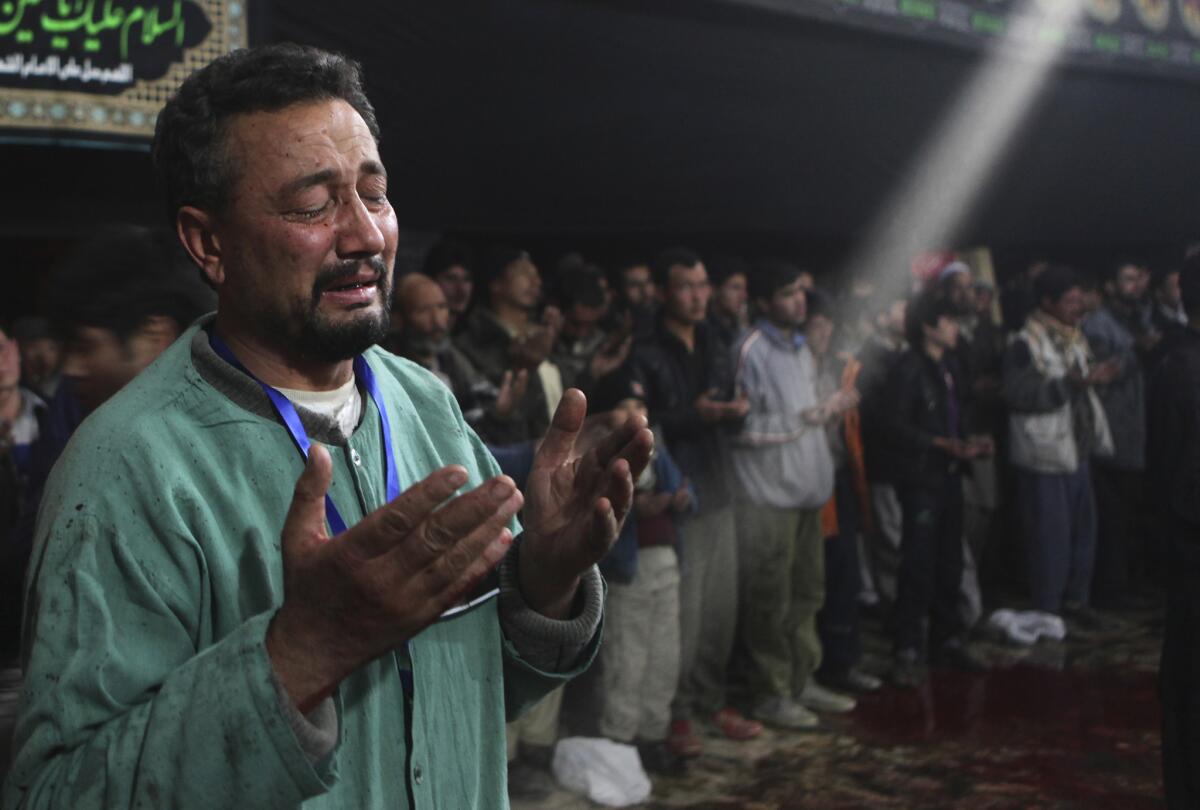Survey: Many Muslims want sharia, but differ on what that means

In Afghanistan, Iraq and many other countries across the globe, most Muslims support making sharia, or Islamic law, the official law of the land, according to a sweeping survey released Tuesday by the Pew Research Center.
But sharia means different things to different Muslims, according to the study. Some supporters believe it should apply only to Muslims. Some want it used in only some kinds of cases. And many Muslims disagree on the morality of divorce, polygamy and birth control.
When Muslims say they want sharia, “that seems to be only part of the picture,” said Neha Sahgal, a senior researcher at the Pew Research Center’s Forum on Religion and Public Life. “Muslims don’t always agree about how to interpret sharia.”
Graphic: How Muslims see sharia
In its broadest sense, sharia encompasses the ethical precepts set forth in the Koran and the example of actions by the Islamic prophet Muhammad. Religious scholars then interpret those principles to guide Muslims on a wide range of subjects, a process known as fiqh.
More than 38,000 Muslims in dozens of countries in Europe, Asia, the Middle East and Africa were interviewed for the Pew study between 2008 and 2012. The findings show that Muslims in different countries share some common beliefs but often disagree on how to put them into practice.
Vast majorities of Muslims surveyed in Iraq and Afghanistan strongly supported making sharia the official law in their countries, as did smaller majorities of Muslims in most countries Pew surveyed in the Middle East, North Africa, sub-Saharan Africa, South Asia and Southeast Asia. The idea was much less popular in Central Asia, Russia and the Balkans, where well under half of Muslims agreed. In Azerbaijan, only 8% of Muslims surveyed backed sharia becoming official law.
Although many Muslims want sharia to be law, overwhelming majorities of them in most countries back religious freedom, according to the survey. Many Muslims are able to hold such “seemingly divergent” views because they don’t believe that sharia should apply to non-Muslims, Pew noted.
In Pakistan, for example, the vast majority of Muslims said sharia should be enshrined as official law, but more than 2 out of 3 of sharia supporters in Pakistan said it should apply only to Muslims, Pew found. Many Muslims elsewhere agreed. Yet there were exceptions: In Egypt, the survey found nearly 3 out of 4 sharia supporters believed Islamic law should apply to all Egyptian citizens.
Muslims also disagree about how to apply sharia, according to the study. In many regions, Muslims believe it should be used to settle family or property disputes, but shy away from severe punishments such as chopping off the hands of thieves, researchers said.
One such area is Southeast Asia, where a median percentage of 84% of Muslims surveyed in Malaysia and Indonesia said religious judges should oversee family law, but only 46% favored severe corporal punishments for criminals. In the Middle East and North Africa, however, strong majorities backed both.
The study also reflected differences in Muslim beliefs around the world. Researchers found Muslims across the globe generally agree that suicide, homosexuality and prostitution are morally wrong, but they are divided on issues such as divorce and birth control.
For instance, polygamy was widely seen as morally wrong among Tunisian Muslims, yet deemed acceptable among most Muslims in Senegal and Niger. Divorce was disdained by most Pakistani Muslims who were surveyed, while a majority of Muslims said it was morally permissible.
There are also disagreements about the rights of women: While firm majorities of Muslims surveyed in Turkey, Bosnia-Herzegovina and other countries said women should have the right to choose whether to wear a veil in public, less than a third of Muslims surveyed in Nigeria and the Democratic Republic of Congo agreed. In most countries included in the study, a majority of Muslims said a wife should always obey her husband.
The survey also examined how Muslims in different countries feel about extremism. In most countries included in the study, more than half of Muslims were worried about religious extremism, and numbers were even higher in Iraq (68%), Guinea Bissau (72%) and Indonesia (78%.) Nearly 3 out of 4 Muslims surveyed said suicide bombings were never justified to defend Islam.
However, there were some places where significant numbers of Muslims said such attacks were at least sometimes justified, including 40% of Muslims surveyed in the Palestinian territories, the highest percentage found in the countries and territories surveyed, according to Pew.
Pew also compared the results of its newest survey with earlier studies of Muslims in the United States. Compared with Muslims elsewhere in the world, U.S. Muslims are more likely to say they have close friends of other faiths and to say that other religions can also lead to heaven.
The newly released study does not include several countries with sizable Muslim populations, including China, India, Saudi Arabia and Syria. Pew said political sensitivities or security concerns prevented researchers from carrying out surveys in some countries.
Maher Hathout, a spokesman for the Islamic Center of Southern California, said he considered the diversity of opinion among Muslims a blessing.
“It leaves room for debate and human intellect to compare and contrast and to choose,” said Hathout, who was not involved in the Pew study. “It’s not a monolith.”
ALSO:
Iraq shuts down 10 television channels
Uganda widow wins compensation after fight
Myanmar panel proposes measures to ease ethnic tensions
More to Read
Sign up for Essential California
The most important California stories and recommendations in your inbox every morning.
You may occasionally receive promotional content from the Los Angeles Times.









